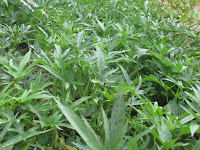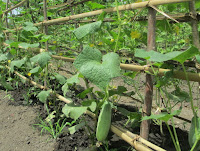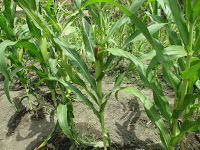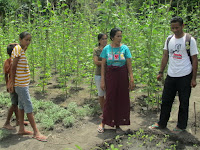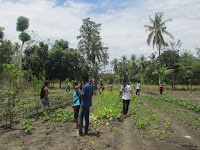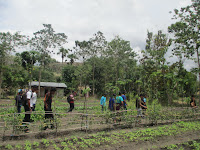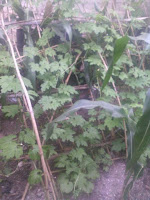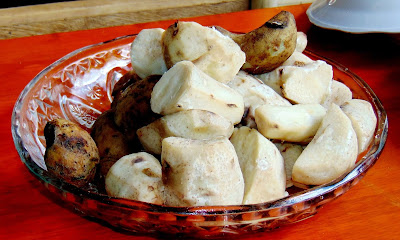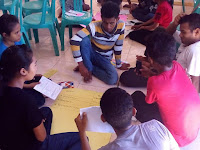A follow-up activity of organic agriculture training Come, Learn and Practice Wangga, September 24, 2016
Monday, 26 September 2016by adminstube
Exposure is a learning process in which the participants interact and learn directly about the topic of learning. Suchlearning brings great benefits to the participants, because they are directly involved in the learning process in order to get experience of discovering new things. Exposure is usually held in a specific place related to the topic as the complement of the learning process itself.
The learning process in Stube-HEMAT Sumba through training on Organic Agriculture: Food Diversity which held in GKS Kawangu, East Sumba, on September 16-18, 2016 with a theme ‘Do you want to eat? Rice is not the absolute one’ was continued on Saturday, September 24, 2016 with exposure to Women Farmers Group (KWT) Rinjung Pahamu, in Wangga, Waingapu.
 Twenty-four participants, mostly students, accompanied by Yulius Anawaru and Apriyanto Hangga, both were team members of Stube-HEMAT Sumba, visited this Woman Farmer Group which is chosenas the exposure destinationbecause its independence in managing vegetable garden consisting of various types of vegetables such as beans, white vegetables (cabbage), eggplant, tomatoes, kale, papaya and gourd. Food crops is also available in the garden such as sweet potatoes (petatas), cassava and corns.
Twenty-four participants, mostly students, accompanied by Yulius Anawaru and Apriyanto Hangga, both were team members of Stube-HEMAT Sumba, visited this Woman Farmer Group which is chosenas the exposure destinationbecause its independence in managing vegetable garden consisting of various types of vegetables such as beans, white vegetables (cabbage), eggplant, tomatoes, kale, papaya and gourd. Food crops is also available in the garden such as sweet potatoes (petatas), cassava and corns.
 Naomi Tamar Pangambang, the leader of KWT Rinjung Pahamu invited the participants to visit the garden and discussed the farmer group. She presented the steps of cultivation and planting vegetables. First, clean the land to be used and make beds. Then sow some manure into seedbeds and leave them for two weeks. Second, while the fertilizer mixed with the soil, sow the vegetable seed into the nursery and water them regularly. The seedlings will grow in two weeks and ready to be moved to the seedbeds. Third, water the seedlings every morning and afternoon, loosen the soil and clean up the grass growing among the seedlings. Fourth, if there are symptoms of disease, spray pesticides from natural materials, such as fermentated gamal leaves, mahogany leaves, chilies and other materials. The process was carried out until the harvesting time.
Naomi Tamar Pangambang, the leader of KWT Rinjung Pahamu invited the participants to visit the garden and discussed the farmer group. She presented the steps of cultivation and planting vegetables. First, clean the land to be used and make beds. Then sow some manure into seedbeds and leave them for two weeks. Second, while the fertilizer mixed with the soil, sow the vegetable seed into the nursery and water them regularly. The seedlings will grow in two weeks and ready to be moved to the seedbeds. Third, water the seedlings every morning and afternoon, loosen the soil and clean up the grass growing among the seedlings. Fourth, if there are symptoms of disease, spray pesticides from natural materials, such as fermentated gamal leaves, mahogany leaves, chilies and other materials. The process was carried out until the harvesting time.
 After the observation and dialogue with Mrs. Naomi, the participants had lunch with corn rice, vegetables and potatoes from the garden. Actually, there are many advantages having vegetable garden independently, such as vegetables availability, healthier vegetables because of organic treatment, lower cost for buyingvegetables and ability to learn in planting crops. After the exposure the participants were challenged to bring out their creative ideas utilizing their house yard into home vegetable garden.
After the observation and dialogue with Mrs. Naomi, the participants had lunch with corn rice, vegetables and potatoes from the garden. Actually, there are many advantages having vegetable garden independently, such as vegetables availability, healthier vegetables because of organic treatment, lower cost for buyingvegetables and ability to learn in planting crops. After the exposure the participants were challenged to bring out their creative ideas utilizing their house yard into home vegetable garden.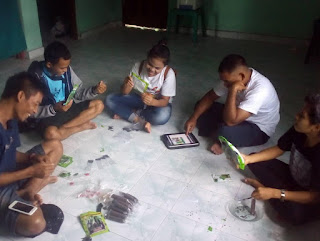 Returning from Wangga, the participants gathered at the secretariat of Stube-HEMAT Sumba and thought what they have learned and committed to begin cultivate their yard become small garden. At the first step, Stube-HEMAT Sumba team provided seeds of vegetables such as kale (water spinach), mustards, spinach, eggplant, gourd and sweet potatoes (petatas) and they chose their own seedlings to be planted.
Returning from Wangga, the participants gathered at the secretariat of Stube-HEMAT Sumba and thought what they have learned and committed to begin cultivate their yard become small garden. At the first step, Stube-HEMAT Sumba team provided seeds of vegetables such as kale (water spinach), mustards, spinach, eggplant, gourd and sweet potatoes (petatas) and they chose their own seedlings to be planted.

 Jufri Adipapa, a student of Unkriswina utilized the yard of Stube-HEMAT Sumba’s secretariat to plant corns, chili, eggplant and melon. Marten Rangga Mbani, one of the participants from STT Terpadu who lived in Mboka Waingapu planted spinach, green mustards, spinach and petatas. He harvested well green mustards but not for the water spinach because of lack of water, while it still needs time for harvesting sweet potatoes. Yati and Meli in STT GKS Lewa harvested sweet potatoes, while Desri and Naomi in Waingapu had crop failure because their vegetables were eaten by goats.
Jufri Adipapa, a student of Unkriswina utilized the yard of Stube-HEMAT Sumba’s secretariat to plant corns, chili, eggplant and melon. Marten Rangga Mbani, one of the participants from STT Terpadu who lived in Mboka Waingapu planted spinach, green mustards, spinach and petatas. He harvested well green mustards but not for the water spinach because of lack of water, while it still needs time for harvesting sweet potatoes. Yati and Meli in STT GKS Lewa harvested sweet potatoes, while Desri and Naomi in Waingapu had crop failure because their vegetables were eaten by goats.
The success and failure in agriculture are part of learning. Keep the spirit and keep on trying. Learn from the agriculture experiences to reach independence and diversity of agriculture in our home. (TRU).
Do you want to eat? Rice is not the absolute one ORGANIC AGRICULTURE PROGRAM: Food Diversity
Monday, 19 September 2016by adminstube
Sumba is one island in East Nusa Tenggara province. Most of the people of Sumba live as farmers and do farming of rice and corn. Because dry season in Sumba is longer than any other regions, it requires certain types of crops which suitable to be planted in this area. The dependency on certain foodstuffs is risky if the crops failed due to weather and pests, as it happened in the past few years. Also the tendency to use chemicals to enhance crop production without thinking about the long-term effects.
 The people of Sumba should be aware to this situation, especially students, as Sumba next generation. There is a stigma that agriculture is considered unattractive, outdated and less prestigious, but actually people should be aware that farming is the backbone of a nation to survive.
The people of Sumba should be aware to this situation, especially students, as Sumba next generation. There is a stigma that agriculture is considered unattractive, outdated and less prestigious, but actually people should be aware that farming is the backbone of a nation to survive.Stube-HEMAT Sumba as a forum for mentoring students to think about it and equip them through a training on Organic Agriculture: Food Diversity, with a theme 'Do you want to eat? Rice is not the absolute one’. The training was held at GKS Kawangu, East Sumba on Friday-Sunday, September 16-18, 2016. The theme was chosen to trigger the creativity of youth to process food except rice, and to motivate them to optimize house yard into a productive garden.
 Thirty six students from various campuses in East Sumba attended the training. The facilitators are expert in the field of agriculture, such as Yulius Anawaru, S.P (team of Stube-HEMAT Sumba), Umbu Ndilu Hamandika, SP. MAP from Food Security Agency, Rahmat Adinata (organic agricultural practitioner) and Bambang Broto Kiswarno, an agricultural practitioner.
Thirty six students from various campuses in East Sumba attended the training. The facilitators are expert in the field of agriculture, such as Yulius Anawaru, S.P (team of Stube-HEMAT Sumba), Umbu Ndilu Hamandika, SP. MAP from Food Security Agency, Rahmat Adinata (organic agricultural practitioner) and Bambang Broto Kiswarno, an agricultural practitioner.
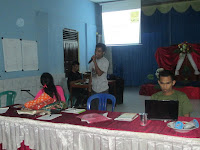
 The presentation of the participants of Exploring to Stube HEMAT Yogyakarta opened the training. They were Irmawati Rambu Konga (STT GKS Lewa) who learn sewing and making bags. Marten Rangga Mbani and Sumitro Umbu Ndamung (STT Terpadu) learned poultry and integrated farming. Frans Fredi (Unwina) practiced textile printing business and pins. Nikson KW Laki Hama (Unwina) learned rearing goat in pens and nutrition, and Krisna Hamba Banju (AKN) learned intensive swine breeding.
The presentation of the participants of Exploring to Stube HEMAT Yogyakarta opened the training. They were Irmawati Rambu Konga (STT GKS Lewa) who learn sewing and making bags. Marten Rangga Mbani and Sumitro Umbu Ndamung (STT Terpadu) learned poultry and integrated farming. Frans Fredi (Unwina) practiced textile printing business and pins. Nikson KW Laki Hama (Unwina) learned rearing goat in pens and nutrition, and Krisna Hamba Banju (AKN) learned intensive swine breeding. Yulius Anawaru, team of Stube-HEMAT Sumba, recalled the green revolution and its impact on Indonesia. Agricultural land was flooded with chemical fertilizers in order to increase crop production. The diverse foodstuffs were finally changed into absolutely rice. Local food then is not developed, even it is eventually forgotten. This should not happen and the organic agriculture movement must be continued and carried out by youth and students.
Yulius Anawaru, team of Stube-HEMAT Sumba, recalled the green revolution and its impact on Indonesia. Agricultural land was flooded with chemical fertilizers in order to increase crop production. The diverse foodstuffs were finally changed into absolutely rice. Local food then is not developed, even it is eventually forgotten. This should not happen and the organic agriculture movement must be continued and carried out by youth and students.Umbu Ndilu Hamandika, from Food Security Agency, East Sumba Regency invited participants to look back on food diversity in Sumba. In addition, it is important for them to pay attention to the quality and food safety for public consumption.
 "What is the purpose of farming or planting?" It was asked by Rahmat Adinata, a practitioner of organic agriculture and activist of organic farming to the participants. All participants were eager to answer, and most of them said for food sufficiency that has been sustainable for years as a livelihood. But, according to Rahmat Adinata, the most appropriate answer was harvesting. Indeed, being a farmer is not easy, starting from land cultivation to be ready for planting, preparing good seed, maintaining plants and so on. He conveyed the materials quite simply and participants got the materials well.
"What is the purpose of farming or planting?" It was asked by Rahmat Adinata, a practitioner of organic agriculture and activist of organic farming to the participants. All participants were eager to answer, and most of them said for food sufficiency that has been sustainable for years as a livelihood. But, according to Rahmat Adinata, the most appropriate answer was harvesting. Indeed, being a farmer is not easy, starting from land cultivation to be ready for planting, preparing good seed, maintaining plants and so on. He conveyed the materials quite simply and participants got the materials well.Agriculture could not be separated from pests. How can we solve it? Various methods of pest control was delivered by Bambang Broto Kiswarno and Abner HR Liwar. Interestingly, the ingredients to make organic pesticide was easily found in Sumba. Including eradicating locusts which broke out violently in East Sumba.
 However, participants were not just as listeners as they were motivated to practice the knowledge they have learned from the facilitators. Several college-based groups were made to do follow up by cultivating land, preparing the planting media and planting vegetables and petatas (sweet potatoes) in house yard. Finally, let us start food diversity, guys! (TRU).
However, participants were not just as listeners as they were motivated to practice the knowledge they have learned from the facilitators. Several college-based groups were made to do follow up by cultivating land, preparing the planting media and planting vegetables and petatas (sweet potatoes) in house yard. Finally, let us start food diversity, guys! (TRU).EXPOSURE TO STUBE-HEMAT YOGYAKARTA New Commitment to Learn and Build Synergy
Wednesday, 31 August 2016by adminstube
 The Exposure Program to Stube-HEMAT Yogyakarta provides opportunity for students and activists of Stube-HEMAT Sumba to have one month learning in Yogyakarta. The implementation of the program is divided into two groups this year.
The Exposure Program to Stube-HEMAT Yogyakarta provides opportunity for students and activists of Stube-HEMAT Sumba to have one month learning in Yogyakarta. The implementation of the program is divided into two groups this year.The first group consists of 3 participants. They are Sumitro Umbu Ndamung, Marten Rangga Mbani (both are theology students of STT Terpadu, Waingapu) and Irmawati Rambu Konga (a theology student of STT GKS Lewa). They departed to Java on July 7, 2016 by Wilis ship and returned back to Sumba on August 6, 2016.
 Sumitro Umbu Ndamung, fondly called Mitro, learned integrated farming with Mr. TO Suprapto in Joglo Tani, Seyegan Sleman, Yogyakarta. He learned the management of agricultural area into one integrated system producing sustainable harvest. Now, he started to cultivate his farmland in Kombapari as his practice what he has learned in Yogyakarta.
Sumitro Umbu Ndamung, fondly called Mitro, learned integrated farming with Mr. TO Suprapto in Joglo Tani, Seyegan Sleman, Yogyakarta. He learned the management of agricultural area into one integrated system producing sustainable harvest. Now, he started to cultivate his farmland in Kombapari as his practice what he has learned in Yogyakarta. While, Marten Rangga Mbani learned chicken farm of Mr. Gendut Minarto in Temon, Kulonprogro. Marten had completed hen coop to accommodate more chickens and laying eggs in Mboka, Kanatang, Sumba.
While, Marten Rangga Mbani learned chicken farm of Mr. Gendut Minarto in Temon, Kulonprogro. Marten had completed hen coop to accommodate more chickens and laying eggs in Mboka, Kanatang, Sumba. Next, Irma learned sewing and making bags made of clothe pieces. Knowing the potency of its student, her campus, STT GKS Lewa lent her a sewing machine. Now, she received order for small bags in Sumba. She used the profits to pay her school tuition.
Next, Irma learned sewing and making bags made of clothe pieces. Knowing the potency of its student, her campus, STT GKS Lewa lent her a sewing machine. Now, she received order for small bags in Sumba. She used the profits to pay her school tuition.The second group consists of Krisna SH Banju (a student of Waingapu State Community College), Frans Fredi K. Bara and Nikson KW Laki Hama (both are students of Wirawacana University, Waingapu). They departed from waingapu on July 31 using Awu ship and arrived back in Waingapu on August 30, 2016.
 In Yogyakarta, Krisna studied swine breeding techniques including management and health care. Her experiences can be directly applied because she had a number of pigs at her home at Lewa, East Sumba.
In Yogyakarta, Krisna studied swine breeding techniques including management and health care. Her experiences can be directly applied because she had a number of pigs at her home at Lewa, East Sumba.While, Nikson learned goat breeding in a stable and business management with Rev. Em. Eko Samodra. The new experience and knowledge really helped him in management of his goat business in Waingapu.
 Last, Fredi learned techniques of printing, making pin, key chain and textile printing at "Tosan Aji." Costumers gave positive responses and some of them directly ordered t-shirts and pins.
Last, Fredi learned techniques of printing, making pin, key chain and textile printing at "Tosan Aji." Costumers gave positive responses and some of them directly ordered t-shirts and pins.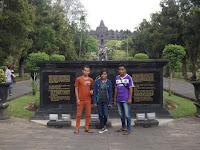
 In addition to improve their knowledge and experience, they went around Yogyakarta city, visited Borobudur and enjoyed their first trip by Pramex train from Yogyakarta to Solo. It was a simple touch but quite meaningful.
In addition to improve their knowledge and experience, they went around Yogyakarta city, visited Borobudur and enjoyed their first trip by Pramex train from Yogyakarta to Solo. It was a simple touch but quite meaningful.
 The participants shared their plans ahead and responsibility to inform their friends and community in Sumba about their experience and knowledge. They also made a commitment that they will keep to communicate each other and strengthen the networks that have been formed related with farming, bag craft, pin making, textile printing and agriculture.
The participants shared their plans ahead and responsibility to inform their friends and community in Sumba about their experience and knowledge. They also made a commitment that they will keep to communicate each other and strengthen the networks that have been formed related with farming, bag craft, pin making, textile printing and agriculture.Finally, the real action of the participants are expected to encourage youth and people to bring progress for Sumba. Let's do smart works and efforts! (TRU).
Human Rights and The Implementation of Social Justice At Londa Lima, East Sumba, May 13 – 15, 2016
Monday, 16 May 2016by adminstube
When we talk about Human Rights in a wide perspectives, the first thing to do is understanding the definition of human rights itself. One expert on Human Rights, Prof. Koentjoro Poerbo Pranoto said that human rights are fundamental rights, the rights that owned by every human being according to the nature of God.
According to Law, No. 39 / 1999 on Human Rights, refers to a set of rights attached to human existence as a creature of God Almighty and is a gift that must be respected, upheld and protected by the state, law, government and anyone as form of honor and protection of human being. Based on Christian faith in Genesis 1: 26-29, about man creation. Man was created in God's image, then human rights are fundamental rights which inherent in human beings as a gift of God.
 Sumba, a region in East Nusa Tenggara province, most of society still have primordial system and tight social strata. Nothing wrong about it in this society, but it will go wrong if the practices cause an imbalance in the implementation of human rights for the lowest strata. This inequality should not happen, because the majority of the people of Sumba are Christians, and referring to Galatians 3:28, which reads, "In this case there is neither Jew nor Greek, there is neither slave nor free, there is no male or female, for you are all one in Christ Jesus ". So, the social strata between master and slave in Sumba is not a fault, but each should complement on and another, not to ignore human rights.
Sumba, a region in East Nusa Tenggara province, most of society still have primordial system and tight social strata. Nothing wrong about it in this society, but it will go wrong if the practices cause an imbalance in the implementation of human rights for the lowest strata. This inequality should not happen, because the majority of the people of Sumba are Christians, and referring to Galatians 3:28, which reads, "In this case there is neither Jew nor Greek, there is neither slave nor free, there is no male or female, for you are all one in Christ Jesus ". So, the social strata between master and slave in Sumba is not a fault, but each should complement on and another, not to ignore human rights. The implementation of human rights is the concern and responsibility of all stakeholders, the governments, NGOs, and community groups. Stube-HEMAT Sumba as an institution which has attention to social issues, especially the implementation of human rights is also called to find solution and respond the implementation of human rights for people in Sumba through a training on Human Rights, with a theme ‘Human Rights and The Implementation of Social Justice."
The implementation of human rights is the concern and responsibility of all stakeholders, the governments, NGOs, and community groups. Stube-HEMAT Sumba as an institution which has attention to social issues, especially the implementation of human rights is also called to find solution and respond the implementation of human rights for people in Sumba through a training on Human Rights, with a theme ‘Human Rights and The Implementation of Social Justice."A training which oriented to young people especially students and church youth was held on Friday – Sunday, May 13–15, 2016 at Londa Lima, Waingapu, East Sumba. It was attended by 30 participants from Unkriswina, STT Terpadu, Waingapu, Academy Sandlewood of Sumba and several church youths in East Sumba.
As the opening of training, Dominggus Umbu Deta, S.Th, the coordinator of Stube-HEMAT Sumba, conveyed the importance of the implementation of human rights as God’s universal sovereignty. God is sovereign over human beings and human rights come from God. It means that violation against human rights is a violation to God’s provision. There is no institution or a person, including state authorities might cancel or reduce these rights, except God.
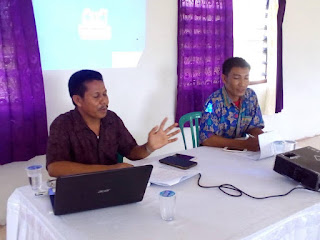 Next session, Matthew Remi Jawa, SH, conveyed that public should be observers on human rights issues, especially in Sumba. Public, especially participants were advised not to violate human rights, because if this happens, it brings legal consequences of such behavior.
Next session, Matthew Remi Jawa, SH, conveyed that public should be observers on human rights issues, especially in Sumba. Public, especially participants were advised not to violate human rights, because if this happens, it brings legal consequences of such behavior.The implementation of children rights was also discussed in this training. Masnauli Marbun, SE, MM, who shared about children rights shared that actually many regulations have been issued by the government and could be used as references to pay attention to children rights.
 Stepanus Makabombu, Kom, M.Si, talked about human rights and public policy. This session highlighted the implementation of human rights done by government for the society, in which everyone has rights to get access of information from local government about their programs, as well as the funding.
Stepanus Makabombu, Kom, M.Si, talked about human rights and public policy. This session highlighted the implementation of human rights done by government for the society, in which everyone has rights to get access of information from local government about their programs, as well as the funding. The participants enthusiastically responded every training materials. Those can can be seen along the process, most of them were involved actively by responding, asking questions and exchanging ideas with the speakers. One follow-up activities of the training done by participant is having observation in his/her neighborhood related to human rights violations. This project will be presented in the next meeting. (DUD).
The participants enthusiastically responded every training materials. Those can can be seen along the process, most of them were involved actively by responding, asking questions and exchanging ideas with the speakers. One follow-up activities of the training done by participant is having observation in his/her neighborhood related to human rights violations. This project will be presented in the next meeting. (DUD).Christian Values and Injustice "Who Am I?"
Monday, 14 March 2016by adminstube
Stube-HEMAT Sumba is a place provided for young people and students in Sumba to equip them to be able to observe thoughtfully many things that happen in the society. When human interacted one another, imbalances often occur because there is injustice which happen continuously even it is structured.
 The ability to observe and analyze injustice in the society is urgent for young people and students to master. Through training on Christian values and Injustice with a theme 'Who Am I?' Stube-HEMAT Sumba hoped that young generation with their movements have courages to sound Christian values and uphold social justice and to be able addressing issues of injustice that happened until now.
The ability to observe and analyze injustice in the society is urgent for young people and students to master. Through training on Christian values and Injustice with a theme 'Who Am I?' Stube-HEMAT Sumba hoped that young generation with their movements have courages to sound Christian values and uphold social justice and to be able addressing issues of injustice that happened until now.
The training was held for three days, from Friday to Sunday, in March 11 - 13, 2016 at GKS Kanjonga Bakul, District of Nggaha Ori Angu, East Sumba. It was attended by many students from various campuses in Sumba and local church youth. The participants were enthusiastic to listen the material and to respond the topic actively both by asking questions and giving opinions.
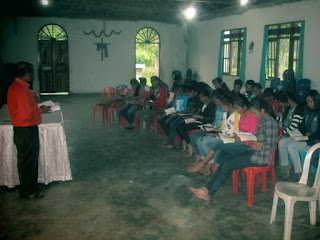 The facilitator in this training are Rev. Dominggus Umbu Deta, S.Th, the coordinator of Stube-HEMAT Sumba, who explained Christian values by observing injustices cases that occur in the Bible. This discussion emphasized on some biblical figures who fought to uphold justice in their ages. Next, the participants focused on specific figure in their discussion group.
The facilitator in this training are Rev. Dominggus Umbu Deta, S.Th, the coordinator of Stube-HEMAT Sumba, who explained Christian values by observing injustices cases that occur in the Bible. This discussion emphasized on some biblical figures who fought to uphold justice in their ages. Next, the participants focused on specific figure in their discussion group.Vic. Lusandry Karanggu Limu, M.Th., one of the speaker, shared the 'existence of Christian character among youth'. This session encouraged participants to focus on how to handle many things happen in society, based on Jesus as the source of ethic manner.
Umbu Ndata Djawa Kori, SH, who worked as a lawyer, explained 'mapping the problem of injustice in East Sumba and its solution'. This session invited participants to look at the various gaps happened in many levels either internationally, nationally or even locally. Not only see the problems in East Sumba, but how the law is related to injustice. Law is tend to a rule, written or orally. If there is a violation, there will be punishment. Therefore, justice is a behavior to enforce the law itself.
Irmawati Rambu Konga, commonly called Irma, a student of STT GKS, said, "Activities organized by Stube-HEMAT Sumba really help me to apply Christian values in the right way, especially the example of some biblical figures who acted to enforce justice".
 The benefit of the training was also expressed by Jufrhy Adipapa, a student of Unkriswina, Waingapu. He said, "Where there's life, there will be a potency for lawlessness, inequality and injustice. Through these activities all of us, as the young generation is reminded and expected to establish justice and it starts from ourselves in our interaction and life with others." (BET)
The benefit of the training was also expressed by Jufrhy Adipapa, a student of Unkriswina, Waingapu. He said, "Where there's life, there will be a potency for lawlessness, inequality and injustice. Through these activities all of us, as the young generation is reminded and expected to establish justice and it starts from ourselves in our interaction and life with others." (BET)






